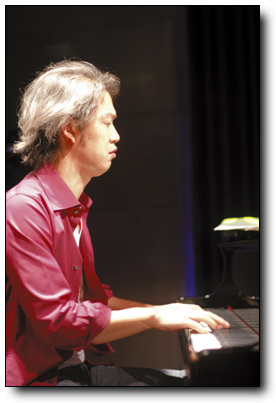Fancyfree pianist, Chong Park
| Chong Park ('88 Dept. of Inst. Music), known as Park Chong-hoon in Korea, crosses the boundaries of musical genres with ease and grace. As winner of the Sanremo Classico International Piano Competition in 2001, Park established himself as a prominent classical pianist. He crosses over to other genres, composing and performing New-Age and Jazz. He even listens to Rock music. Park is a genre of his own. The Yonsei Annals met this acclaimed pianist at a Jazz club in Apgujeong. |
Annals: How did you start playing the piano and how did you decide to become a pianist? 
Chong Park: I don? really remember. I started the violin first at age three and then went on to the piano at age five. Playing the piano has been the most enjoyable and most normal thing for me. I did go to a 'normal' middle school, but I learned there that playing the piano was the thing for me. There was nothing I liked better.
Annals: How were your days at Yonsei?
Park: I wasn't the best of students. I didn't study much my freshman year. My clearest memory is of a lesson with Prof. Lee Kyung-sook (Dean of Col. of Music). As usual I was unprepared for class. She had had enough of it and told me to forget about becoming a pianist. Then she kicked me out. It was then that I finally cleaned up my act. I also remember the boring Chapel classes. My friends and I would start going to Chapel and all of a sudden we found ourselves going to play pool instead. I had to take Chapel until my last semester.
Annals: You studied for ten years after leaving Yonsei at both Julliard and Imola School of Music. What made you take that path?
Park: Well, I personally believe that one has to study until one dies. Classical music which obviously isn't Korean, should be studied where it was born; in the West. Most musicians go abroad early for this reason. However, I didn't find it necessary because I met so many wonderful people and liked Yonsei Univ. I got the most out of it as I could.
Annals: You mentioned in prior interviews that you had a hard time at Julliard. How did you overcome it?
Park: I had given concerts and won concours (music competitions) during my college years and I was a bit arrogant when I first went to study at Julliard. My teacher Seymore Lipkin taught me that music is more than mere practice and skill. It took me a while to understand what he meant. Those were some very dark times for me, I even thought of giving up on music. However, I didn't give up, pulled through and let life take its course. One of the most important things I learned from this was perseverance; it pays off in the end.
Annals: What else do you find hard about being a pianist?
Park: It seems that playing the piano is no longer about fun or about touching and inspiring people. The competition is so fierce that it seems that pianists are forgetting the real meaning of music. Music is not about winning concours or making money or gaining fame. Music is about moving people and being moved yourself.
Annals: Are you yourself moved when you play? You have composed three albums, do you use these emotions when you compose?
Park: The emotions that are left behind every stage are always different. When composing, I capture these emotions, whether they are from a performance or other experiences. The strongest and most lasting of these impressions becomes my music.
Annals: Some would consider it rare for a classical pianist to compose and interpret New-Age and Jazz. What do you have to say to that?
Park: People say it is rare, but creating music that is easy to relate to has always been a part of my life. I have composed and played all kinds of music for my family and friends since I was a child. Also I listen to all kinds of music regardless of genre. Why should my interpretations and compositions be any different? They are all "Chong Park's" music in the end.
Annals: Is there anything you would like to tell Yonseians about life in general?
Park: Enjoy life. Don't live it centered on your studies, forgetting what fun is. What seems to be mind boggling and life changing now aren't big deals when you look back. You don't know what will happen to you in the future. Sometimes it's best to let life take its course and not fret. The most important thing you can do is to do what you like best. You will do it well and be happy in the process.
Chong Park is a free soul. He did not let what others think bother him. Park became a pianist because it made him happy and because he liked it. Had he been an ordinary pianist, Chong Park would have been satisfied with his accomplishments so far. But Chong Park will not stop here. He will continue to surprise you with his innovative spirit. For Chong Park is truly what one calls footloose and fancy-free.

